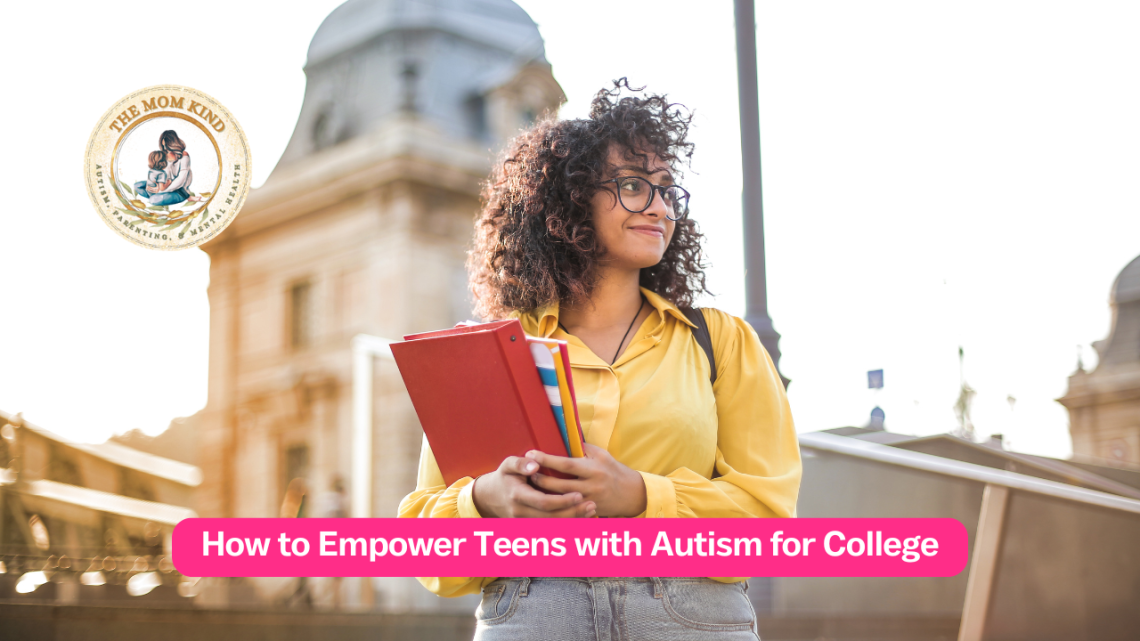Teens living with autism are nothing short of exceptional human beings. Their neurological differences may give them strengths, such as technological mastery, the ability to pick up on patterns and learn quickly, punctuality, and discipline in routines.
Armed with all of these capabilities, teens with autism can absolutely thrive in college and their adult life after graduation. That is if they’re set up to do so.
How to Empower Teens with Autism for College
Teens with autism navigate unique challenges that will continue in their lives after high school. Understanding social cues, sensory overload, and emotional control are a few of the most talked about.
Preparation and guidance from trusted adults in their life will make all the difference in your teen with autism overcoming challenges, graduating college, and transitioning into adulthood successfully.
Talk About What They Want to Do After High School
Like any teen, those living with autism are likely to have an idea of what they want to do after high school. How they articulate their vision to you will depend on the severity level of their autism.
Nonetheless, it’s essential to communicate with them through speech or nonverbal cues about what colleges and career paths they are interested in after high school. Connect with them on these topics many times in different settings, such as:
⦁ Lunch dates
⦁ At dinner with the family
⦁ Car rides to and from school
⦁ Spontaneous conversations
⦁ Meetings with teachers and others in their support circle
It will take many interactions to flesh out their plans for college and their career. So, take advantage of as many as you can. And make notes about how you can support them best on their path.
Identify Majors That Align With Their Interests
Once you and your teen have a general idea of what they want to do after graduating high school, dig into college majors that align with their interests and career plans.
One of the most admirable things about teens with autism is that they typically have deeply focused interests or specialized skills. They love what they love, and spend the majority of their time sinking deeply into these things.
This is helpful when choosing a major because you don’t have to go through the long list of options with your teen. However, in addition to considering what they love to do, the following should be considered as well when deciding on a college major:
⦁ What they’re good at
⦁ What the world needs
⦁ What they can get paid for
Let’s say your teen loves technology. They’re good at assembling components and building things. The world needs more people in manufacturing to address the labor shortage and growing reliance on technology in this industry. And your teen can get paid for putting together products and operating high-tech machinery.
Majoring in engineering or electrical engineering technology would be a great fit for your teen who loves tech. This would also set them up for a sustainable tech-driven career in smart manufacturing. They could work in a smart manufacturing facility fixing and operating robotics, IoT devices, and other intelligent tech.
Come up with a list of majors that accounts for what they’re passionate about, what they’re talented at, and what they could get paid well for in the work world.

Map Out the Kind of Support They’ll Need in College and After
Teens with autism will need a little more support and access to specific tools and resources to thrive in college and beyond. Understanding their exact needs will make it easier for you to help them find a college and career that can accommodate them.
Define the specific support, tools, and resources your teen will need based on their level of autism and how they’ve been navigating life so far.
For example, teens with level 1 Autism Spectrum Disorder (ASD) are known as high-functioning. They’re independent in a lot of ways but still struggle with social communication, organization, and repetitive behaviors that can hinder their ability to be completely self-sufficient.
In this case, your teen could benefit from access to disability services and a counselor who specializes in working with autistic students. One-on-one academic support from all professors would be helpful as well.
Once they graduate from college, an inclusive, diverse workplace with designated resources for autistic employees would be a great fit. Having an ongoing mentor living in similar circumstances as your teen could also benefit them in life after college.
Teens with Level 2 or 3 ASD may have higher support needs for their autism traits to perform well and navigate what impacts their functionality.
Ultimately, every teen with autism is unique. The support they’ll need in college and after graduation will be too.
Visit Prospective Colleges and Jobs
A college visit tour is beneficial for any teen, but especially those living with autism. Your teen needs to be completely comfortable with the college they plan to attend.
There’s no better way to gauge that comfortability than through a firsthand experience of life on campus. And you can get all your questions about how the college plans to support your teen with autism answered.
Sit down with your teen and plan visits to colleges they’re interested in. Take them on field trips to experience different career options too. Your teen needs to see what their potential career paths look like in action.
You can call companies to see if they can give you a formal tour of what it’s like to work there. You can also show them different jobs in passing while you’re running errands and attending events.
Final Thoughts: How to Empower Teens with Autism for College
It’s scary thinking about your teen with autism on their own in this big world. But they can thrive in it, with the proper preparation and guidance. Get them off to a great start by helping them get ready for college and a career they can be proud of.




